带初三英语易错题训练
带答案初三英语易错题训练

中学英语易错题训练选择题1.—Haveyoufoundthebook?——.A.No,notevenonceB.NotyetC.No,alreadyD.Yes,Idid2.Ididn’tquiteunderstandhowtheygotthebooksbackso.A.quickB.morequicklyC.quickerD.quickly3.Iusedonmyown.A.toliveB.liveC.livingD.toliving4.—youevertoBeijing?—Yes,once.A.Have;goneB.Did;goC.Do;goD.Have;been5.Sorry,butyouraddressagain,please.Icatchit.A.didn’tB.don’tC.won’tD.wouldn’t6.——IsawKateagreendressatthemeeting.——Ithinkshelooksbetterred.A.dressed;inB.puton;wearC.wearing;inD.wear;puton7.Whatyouangrywith?A.haveB.willC.areD.do8.Thedirtyriver.A.issmeltbadB.smellsbadlyC.issmeltbadlyD.smellsbad9.Theradioistoonoisy.Willyouplease?A.turnoffitB.turnitonC.turnitupD.turnitdown10.There’sgoingtoafilmshowmodernartinthelibrary.A.be;atB.have;ofC.have;onD.be;about11.Wouldyoupleaseyourshoesonthefloor?A.nottodropB.notdropC.don’tdropD.notdropping12.Wheredoesyoursisterhermeals?A.hasB.haveC.havingD.had13.Mikeandhissisterhereamomentago.A.isB.areC.wereD.be14.ItwasNewYear’sEve.XiaoMingwasbusysomenewpicturesonthewall.A.putupB.putsupC.puttingupD.puttingon15.Ioftenporridgeforbreakfastthosedays.A.havingB.haveC.hasD.had16.TeaisinthesouthofChina.A.growB.growsC.growingD.grown17.Howaboutoutforawalk?A.goB.togoC.goingD.goes18.Iheardherthatshewastoofat.A.saysB.tosayC.saidD.say19.Shallweattheschoolgate?A.meetB.tomeetC.metD.meeting20.It’smuchbetterthanTVathome.A.watchB.watchesC.watchingD.watched21.Look!LiLeiandLinFengkiteoverthere.A.isflyingB.areflyingC.fliesD.flew22.YouthehouseatonceorIthepolice.A.leave;callB.leave;willcallC.willleave;callD.willleave;will23.Thetrainfortenminuteswhenwereachedthestation.A.hadgoneB.hadleftC.wentawayD.hadbeenaway24.TheKingsTVwhenItoseethem.A.werewatching;wentB.waswatching;wentC.arewatching;aregoingD.watched;wasgoing25.MyuncleforHong Kongnextweek.A.isgoingB.isleavingC.willgoD.left26.Howmanymachinesinthelastfewweeks?A.didtheymakeB.willtheymakeC.havetheymadeD.aretheymaking27.Whathedoassoonashefreetomorrow?A.does;isB.will;willbeC.will;isD.does;willbe28.IthoughtheussomethinginterestingaboutFrancebecausehethere.A.wouldtell;hadbeenB.hadtold;wouldgoC.willtell;wentD.wouldtell;hadgone29.Wewillhaveasportsmeetingifitraintomorrow.A.won’tB.isn’tC.doesn’tD.has30.—WherewereyouinJulylastyear?—ThistimelastyearmyfamilyandIgrandparentsinNewYork.A.wasvisitingB.visitedC.hadvisitedD.werevisiting31.Couldyoutellmeifsheatalktomorrow?A.wouldgiveB.hasgivenC.willgiveD.gives32.Hehardlyhurthimselfintheaccident,he?A.doesn’tB.didn’tC.didD.does33.HowlongtheTVplay?A.has;beganB.did;openC.did;lastD.has;watched34.MrSmithwithhisparentsChinasincetwoyearsago.A.havebeeninB.havegonetoC.hasbeentoD.hasbeenin35.ofthetwogirlsisfromBeijing.A.AllB.BothC.NoneD.Neither36.Wewenttotravelwithsomefriendsof. Bours C.our D.ourselves37.Whynotlookupthenewwordinadictionary youdon’tknowit?A.ifB.thatC.thoughD.whether38.allthepassengersarehere,whydon’twestartatonce?A.AssoonasB.AfterC.NowthatD.When39.—I’mgoingtoHangzhouforaholidaythisweekend.—youarethere,canyoubuymesomegreentea?A.BecauseB.WhileC.IfD.Though40.I can’tunderstandthispassagetherearenonewwordsinit.A.ifB.becauseC.thoughD.and41.thenightbeforeChristmasDay,parentsfilltheirchildren’sstockingwit hsmallpresents.A.InB.AtC.ToD.On42.ThebookwaswrittenEnglish.A.inB.withC.fromD.by43.—Sorry,MissZhang.I’mlateagain.—Ohno,Meimei.You’rejustintimeclass.A.forB.atC.ofD.on44.Youdon’tneedtolookeverynewwordinyourdictionarywhilereading.A.forB.atC.afterD.up45.Thecoatboughtlastweekistoobigforme.I’dliketochangeitforaone.A.smallrgeC.nicerD.smaller46.Ofallthesesubjects,IlikeChinese.A.moreB.betterC.wellD.best47.Thingsareonthemoonontheearth.A.muchlighter;thanB.muchheavier;thanC.asheavy;asD.notsolight;as48.—I’vehadenoughbread.Wouldyoulike?—No,thanks.A.afewmoreB.onemoreC.anothermoreD.somemore49.Theiceinthelakeisaboutonemeter .It’sstrongenoughtoskateon.A.longB.highC.thickD.wide50.—willMrGreengobacktoLondon?—Intwoweeks.A.Howoften BHowlong C.Howsoon D.Howfar51.—Wearegoingtoseeafilmthisevening.Whynotgowithus?—Ihavetodomanythingsthisevening.I’m,yousee.A.freeB.gladC.sorryD.busy52.Look!beautifulthatlakeis!A.WhatB.HowC.HowaD.Whata53.I’mstillhungry.CouldIhavetwopiecesofbread,please?A.muchB.manyC.moreD.most54.—Whodiditbetter,BillorHenry?—IthinkBilldidjustHenry.A.aswellasB.asgoodasC.asbetterasD.morebadlythan55.MrSmith’splane.Let’swaitforhimhere.A.hasn’tarrivedB.didn’tarriveC.doesn’tarriveD.couldn’tarrive56.Almostallthewater gone.Pleasesavewater!A.areB.isC.haveD.were57.MrLiisout.Butheheretenminutesago.A.wasB.isC.willbeD.wouldbe58.—Look!Thebusiscoming.—Butit’sfullofpeople.We can’tit.A.getoffB.getdownC.getonwithD.geton59.JaneanewdresseverymonthwhenshewasinShanghai.A.buysB.isbuyingC.boughtD.willbuy60.A.talkonChinesehistoryintheschoolhallnextweek.A.isgivenB.hasbeengivenC.willbegivenD.willgive61.Iwilltellyouhowtogettotheplace,you’dbetterit.A.try;onB.get;offC.take;downD.pick;up62.GermanyandGreat Britainarecountries,butChinaandIndiaareones.A.developing;developedB.developed;todevelopC.developed;developingD.todevelop;developing63.—MustIfinishmyhomeworknow?—No,you.Youdoitthisevening.A.mustn’t;canB.needn’t;mayC.can’t;mustD.needn’t;must64.TheVIPS(VeryImportantPersons)from21countrieswilltheAPECinShanghaithisautumn.A.holdB.takepartinC.joinD.attend65.Thegovernmentwillsomenewcollegesformorestudent’storeceivehighereducation.A.setupB.setoutC.putdownD.puton66.—Excuseme.Willyoupleasetellmethewaytotherailwaystation?—Oh,sorry,butIdon’tknow.Yougoandaskthatpoliceman.A.mayB.mustC.wouldD.should67.—It’salovelyday,it?—Yes.Let’sgooutforawalk.A.doesn’tB.haven’tC.aren’tD.isn’t68.—WecanuseMSNtowitheachotheronthenet.—Really?Willyoushowmehowtouseit?A.speakB.talkC.sayD.tell69.—Whatdoesthe sentence“Don’ttroubletilltroubleyou”mean? —Sorry,Ihavenoidea.A.troubleB.troublesC.troubledD.willtrouble70.—Didyouworkouttheproblem,Tom?—Yes,ofcourse.Itotheteacher’s.A.havejustbeenB.havejustgotC.havejustcomeD.havejustgone71.—doyouaboutspring?—Theflowersandthegreentrees.A.How;likeB.How;thinkC.What;thinkD.What;like72.—Mikewantstoknowifapicnictomorrow.—Yes.Butifit,we’llvisitthemuseuminstead.A.youhave;willrainB.youwillhave;willrainC.youwillhave;rainsD.willyouhave;rains73.Weusuallyhavesixlessonsaday,andeachofthem45minutes.ststsC.haveD.need74.IttenyearssincetheytoFrance.A.was;movedB.was;havemovedC.is;havemovedD.is;moved75.Today,theforestshavealmostgone.Peoplemustdowntoomanytrees.A.stoptocutB.stopfromcuttingC.bestoppedtocutD.bestoppedfromcutting76.Thedoctordidwhathecouldthatchild.A.saveB.tosaveC.savedD.saving77.Mothersaidthatcookingmuchtimeeveryday.A.paidB.spentC.madeD.took78.I can’tunderstandtheboyalone.A.whysheleftB.whydidsheleaveC.whyhadsheleftD.whydidsheleave79.You’dbetteryourshoesonthefloor?A.nottodropB.notdropC.don’tdropD.notdropping80.—Yourcoatlooksnice.Isitcotton?—Yes.It’sShanghai.A.madeof;madebyB.madeof;madeinC.madefor;madebyD.madefrom;madein81.—SoyouwenttoseethefilmwithTom.—Yes.Bobwithme.A.won’tgoB.isn’tgoingC.doesn’tgoD.wouldn’tgo82.—Excuseme.WhereistheScience Museum?—TakeNo.3busandatthefourthstop.A.getonB.getoffC.getupD.getto83.—Yournameagain?Iquitecatchit.—FedericoMacAdam.A.didn’tB.don’tC.wouldn’tD.won’t84.ThisisanoldphotoofminewhenI.A.haveshorthairsB.hadshorthairsC.haveshorthairD.hadshorthair85.—CanIthisbook?—Yes,butyoumustn’tittoothers.A.lend;borrowB.borrow;keepC.borrow;lendD.lend;keep86.—WhichofShanghaidoyoucomefrom?—Letmeshowyouonthemap.A.cityB.villageC.countryD.part87.Canyoutellus?A.wherehaveyougoneB.whereyouhavegoneC.wherehaveyoubeenD.whereyouhavebeen88.Therearefewpeopleontheplayground,?A.arethereB.aretheyC.aren’tthereD.aren’t they89.—Theyhaven’tpaidfortheirtickets,havethey?—.Theydidn’tpayanymoney.A.Yes,theyhaveB.No,theyhaven’tC.Yes,theydidD.No,theydidn’t90.—Ihaven’tseenyouforalongtime.Howiseverything,Kate?—.ANottoobad B.Verywell C.Notatall D.I’mallright 91.—Ihopeyoudon’tmindmypointingoutyourmistakes.—.A.NotatallB.You’rewelcomeC.OfcourseD.It’s apleasure92.—DoyoumindifIopenthedoor?—.A.No,ofcoursenotB.Yes,pleaseC.Yes,youcanD.No,you can’topenit93.—Mike,I’llgoforthefootballmatch.—Ihopeyouwinthegame.A.Verywell.B.Seeyou.C.Goodluck!D.congratulations!94.—Ilostmynewbikeyesterday.—.A.Don’tworry.Youcanbuyanotherone.B.I’msorrytohearthat.C.Nevermind.D.Whodidit?95.“Let’sgoforalongwalkintothecountrythismorning.”“,butIthink I’mcatchingacold.”A.IcertainlycouldusetheexerciseB.Yes,let’sgoC.Sure.I’dliketogoforalongwalkD.No,Iwon’t96.,butIcan’ttellyouaboutthat.A.ExcusemeB.I’msorryC.AllrightD.Bytheway97.—?—It’seight.A.WhatdayisitB.What’sfiveandthreeC.HowoldareyouD.What’syourtelephonenumber98.—Whatanicemeal!Thankyouforhavingus.—.A.Itdoesn’tmatterB.ItwasapleasureC.NotniceenoughD.Withpleasure99.—.—Yes,please.I’dlikehalfakiloofmeat.A.WouldyoulikesomemeatorfishB.WhataboutsomethingtoeatC.HowdoyoulikethisD.CanIhelpyou100.Howlonghashe?A.diedB.beendeathC.beendeadD.dead 参考答案:1-5 BDADA6-10CCDDD11-15BBCCD16-20DCDAC21-25BBDAB26-30CCACD31-35CCCDD36-40BACBC41-45DAADD46-50DADCC 51-55DBCAA56-60BADCC61-65CCBDA66-70ADBBA71-75DCBDD 76-80BDABB81-85DBADC86-90DDABB91-95AACBA96-100ABBDC。
中考英语语法易错点总结练习题20题(带答案)
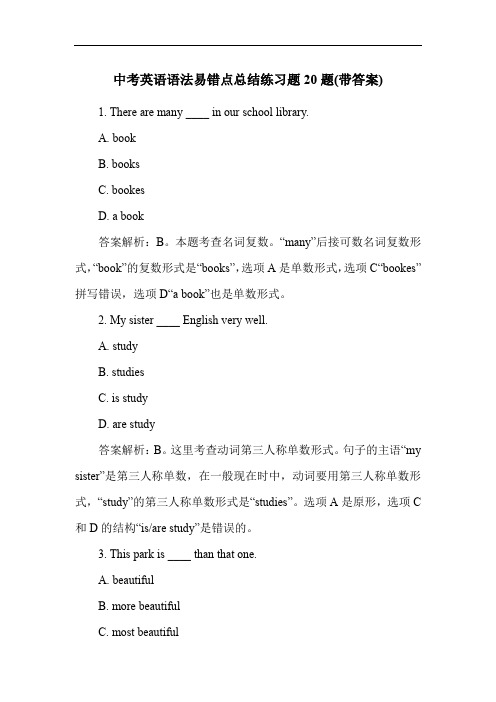
中考英语语法易错点总结练习题20题(带答案)1. There are many ____ in our school library.A. bookB. booksC. bookesD. a book答案解析:B。
本题考查名词复数。
“many”后接可数名词复数形式,“book”的复数形式是“books”,选项A是单数形式,选项C“bookes”拼写错误,选项D“a book”也是单数形式。
2. My sister ____ English very well.A. studyB. studiesC. is studyD. are study答案解析:B。
这里考查动词第三人称单数形式。
句子的主语“my sister”是第三人称单数,在一般现在时中,动词要用第三人称单数形式,“study”的第三人称单数形式是“studies”。
选项A是原形,选项C 和D的结构“is/are study”是错误的。
3. This park is ____ than that one.A. beautifulB. more beautifulC. most beautifulD. the most beautiful答案解析:B。
本题考查形容词比较级。
句中有“than”,表示两者比较,要用比较级形式。
“beautiful”是多音节形容词,其比较级是“more beautiful”。
选项A是原级,选项C和D是最高级形式,最高级用于三者或三者以上比较。
4. There ____ a lot of students in the classroom.A. isB. areC. hasD. have答案解析:B。
考查“there be”句型中的主谓一致。
“a lot of students”是复数形式,在“there be”句型中,be动词要根据后面的名词复数形式用“are”。
选项A“is”用于单数或不可数名词,选项C和D“has/have”表示“有”时,主语是人,而这里是“there be”句型。
九年级英语语法易错点总结练习题50题(带答案)
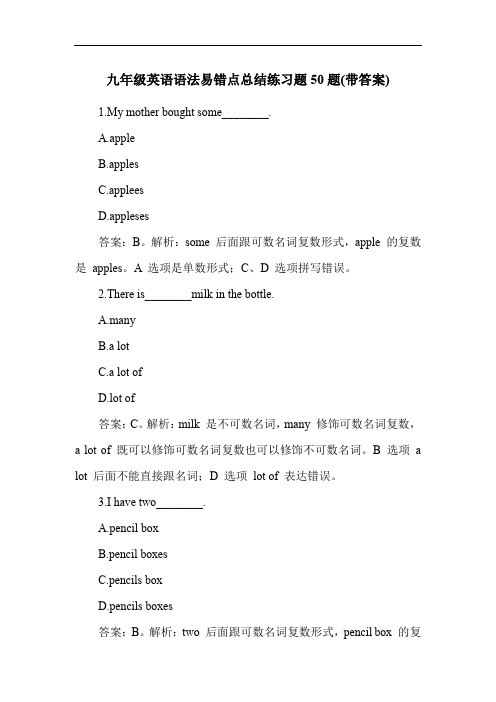
九年级英语语法易错点总结练习题50题(带答案)1.My mother bought some________.A.appleB.applesC.appleesD.appleses答案:B。
解析:some 后面跟可数名词复数形式,apple 的复数是apples。
A 选项是单数形式;C、D 选项拼写错误。
2.There is________milk in the bottle.A.manyB.a lotC.a lot ofD.lot of答案:C。
解析:milk 是不可数名词,many 修饰可数名词复数,a lot of 既可以修饰可数名词复数也可以修饰不可数名词。
B 选项a lot 后面不能直接跟名词;D 选项lot of 表达错误。
3.I have two________.A.pencil boxB.pencil boxesC.pencils boxD.pencils boxes答案:B。
解析:two 后面跟可数名词复数形式,pencil box 的复数是pencil boxes。
A 选项是单数形式;C、D 选项拼写错误。
4.There are a lot of________in the park.A.peopleB.peoplesC.peopleesD.peopleses答案:A。
解析:people 本身就是复数形式,表示“人们”,没有peoples、peoplees、peopleses 这样的形式。
5.My father has a lot of________.A.work to doB.works to doC.workes to doD.workses to do答案:A。
解析:work 表示“工作”时是不可数名词,没有复数形式。
B、C、D 选项拼写错误。
6.There are some________on the desk.A.bookB.booksC.bookesD.bookses答案:B。
带答案初三英语易错题训练

D. Yes,选择题中学英语易错题训练1. — Have you found the book? ------------A. No, not even onceB. Not yetI did 2. I didn ' t quite understand how they got the books back so C. quicker C. No, alreadyA. quick 3. I used on my ow n. A. to liveB. more quickly D. quickly B. liveC. livi ngD.toliving4.—you ever to Beijing ?B. Did; go A. Have; gone Have; bee n 5. Sorry, but your address aga in, please. I A. didn ' t B. don ' t wouldn ' t —Yes, on ce.C. Do; go catch it. C. won ' t 6. ---- I saw Kate a green dress at the meeting. ---- I think she looks better red. __________ A. dressed; in B. put on; wear C. weari ng; inD. D.D.wear;put on7. What you an gry with? A. have B. will C. are D. do8. The dirty river A. is smelt bad B. smells badly C. is smelt badly D.smells bad 9. The radio is too no isy. Will you please A. turn off it B. tur n it on C. turn it up D.turn it dow n 10. There ' s going toA. be; at about a film show modern art in the library. C. have; onB. have; of D. be;11. Would you please A. not to drop dropp ing 12. Where does your sister A. has your shoes on the floor? B. not drop C. don ' t drop D. nother meals? B. have C. havi ng D. had13. Mike and his sister here a mome nt ago. B. are A. is C. wereD. beD. putti ng14. It was New Year ' s Eve. Xiao Mi ng was busy some new pictures on the wall.B.puts up C. putt ing upon 21. Look! Li Lei and Lin Feng kite over there.22. You the house at once or I the police.26. How many machi nesin the last few weeks?A. did they makeB. will they make they making 27. What he do as soon as he free tomorrow?does; will be28. I thought he ___________ us something interestingabout France because hethere.A. would tell; had bee nA. put upA. havi ngB. haveC. h as16.Tea is in the south of China.A. growB. growsC. g row ing17. How about out for a walk?A. goB. to goC. going18.I heard her that she was too fat.A. saysB. to sayC. said19. Shall we at the school gate?A. meetB. to meetC. met20.It ' s much better than TV at home.D. had D. grow nD.goes D. say D. meet ingC. watch ingD. watched A. is flying B. are flying C. flies D. flewA. leave; callB. leave; will callC. will leave; callD.will leave; will23. The train for ten minu tes whe n we reached the stati on.A. had goneB. had leftC. went awayD. had bee naway24. The Kings TV when I to see them. A. were watchi ng; went C. are watch ing; are going 25. My un cle for Hong Kong next week.A. is goi ngB. is leavi ng leftB. was watchi ng; went D. watched; was goingC. will goD.C. have they madeD. areA. does; isB. will; will beC. will; isD.B. had told; would go15.1 ofte nporridge for breakfast those days.A. watchB. watchesD. hasC. will tell; wentD. would tell; had gone29. We will have a sports meet ing if it rai n tomorrow.A. won ' tB. isn 'C. doesn ' t30. — Where were you in July last year? —This time last year my family and I A. was visit ing were visit ing 31. Could you tell me if she A. would give B. visited gran dparents in New York. C. had visited a talk tomorrow? 32. He hardly hurt himself in the accide nt, A. doesn ' t B. didn ' t B. has give n C. will give he? C. did D.D. givesD.does 33. How long the TV play A. has; bega nwatched B. did; ope n C. did; last D.has;34. Mr Smith with his pare nts A. have bee n in bee n inChina since two years ago. C. has bee n to B. have gone toD. has35.of the two girls is from Beiji ng. A. All B. Both C. None D. Neither36. We went to travel with some friends ofA. us B oursC. our 37. Why not look up the new word in a dictionary A. if B. that you don __ C. though 't we start at once?D. ourselves 't know it? D. whether 38. all the passe ngers are here, why donA. As soon asB. After 39. — I ' m going to Hangzhou for a holiday this weekend. — you are there, can you buy me some gree n tea? A. Because B. WhileC. If 40. I can ' t un dersta nd this passage there are no new words in it. A. if B. because C. Now thatD. When D. Though C. though 41. the night before Christmas Day, pare nts fill their childre n stock ing with small prese nts. A. In D. and'sB. AtC. ToD. On English. B. with 42. The book was writte n A. in 43. — Sorry, Miss Zhang. I ' m late again. class.C. from —Oh no, Meimei. You'D. by re just in timeA. forB. atC. ofD. on44. You don ' t need to look every new word in your dictio nary while readi ng. A. for B. at C. after 45. The coat bought last week is too big for me. D. upI ' d like to change it for a one. A. small B. large 46. Of all these subjects, I like Chi nese C. nicer D. smaller A. more B. better C. well D. best47. Things are on the moon on the earth. A. much lighter; tha n C. as heavy; as 48. — I ' ve had eno ugh bread. Would you like A. a few more B. one more B. much heavier; tha n D. not so light; as —No, tha nks. C. ano ther more D. some more 49. The ice in the lake is about one meter It ' s strong eno ugh to skate on. A. lo ng B. high C. thick D. wide 50. A. How ofte nwill Mr Gree n go back to London? B How long —In two weeks. C. How soon D. How far 51. —We are going to see a film this evening. Why not go with us? —I have to do many things this eve ning. A. free B. glad beautiful that lake is! 52. Look! A. What B. How 53. I ' m still hungry. Could I have two A. much B. many 54. — Who did it better, Bill or Henry? A. as well as more badly tha n 55. Mr Smith ' s plane A. hasn ' t arrived .LetD. couldn ' t arrive 56. Almost all the water A. are 57. Mr Li is out. But he A. was be 58. — Look! The bus is C. sorry C. How a ,you see. D. busy D. What a pieces of bread, please? C. more —I think Bill did just D. most Henry B. as good as C. as better as D. B. didn 'gone. B. iss wait for him here. t arrivePlease save water! here ten minutes ago. B. is coming.C. doesn ' t arriveC. haveC. will be—But it ' s full of people. Wecan ' tD. D. werewouldit.69.70.A. have just beenB. have just gotC. have just comeD.haveA. get offB. get dow nC. get on withD. get on 59. Jane a new dress every month whe n she was in Shan ghai.A. buysB. is buyingC. boughtD. willbuy60. A. talk on Chin ese historyin the school hall next week. A. is give n B. has bee n give nC. will be give nD. will give61.1 will tell you how to get to the place, you' d better Jt ________ .______A. try; o nB. get; offC. take; dow nD.pick; up62. Germany and Great Britain are countries, but China and India areon es.A. develop ing; developedB. developed; to developC. developed; develop ingD. to develop; develop ing63. — Must I fin ish my homework now? — No, you . You do it thisevening.A. mustn ' t; canB. needn ' t ; mayC. can ' t; mustD. needn' t; must64. The VIPS (Very Importa nt Perso ns) from 21 cou ntries will the APEC i _____Shan ghaithis autu mn. 65. The gover nment will highereducati on.A. holdB. take part inC. joi n some new colleges for more studentD. atte nd's to receive66. A. set up—Excuse me. Will you please tell me the way to the railway station? 't know. You B. set out C. put dow n D. put on67. —Oh, sorry, but I donA. may—It ' s a lovely day, A. doesn ' t B. mustit?B. haven ' 68. —We can use MSN togo and ask that policeman. D. shouldC. would —Yes. Lett C. arens go out for a walk.'tD. isn ' twith each other on the n et. —Really? Will you show me how to use it? A. speakB. talkC. say—What does the sentence “ Don' t trouble till troubleD. tellyou” mean?—Sorry, I have no idea.A. troubleB. troublesC. troubled—Did you work out the problem, Tom? —Yes, of course. I to the teacher D. will trouble's.just gone71. — do you about spring?— The flowers and the gree n trees.A. How; likeB. How; thi nkC. What; thi nkD.What; like72. — Mike wants to know if a picnic tomorrow.—Yes. But if it , we' ll visit the museum in stead.A. you have; will rainB. you will have; will rainC. you will have; rainsD. will you have; rains73. We usually have six less ons a day, and each of them B.lastsC. haveD. n eed 74. It ten years since they to France ______________A. was; movedB. was; have movedmoved76. The doctor did what he could that child.A. saveB. to saveC. savedD. savi ng 77. Mother said that cook ing much time every day. A. paidB. spe ntC. madeD. took78.1 can ' t understandthe boy alone.A. why she leftB. why did she leaveC. why had she leftD. why didshe leave79. You ' d betteryour shoes on the floor?A. not to dropB. n ot drop C .don ' t drop D. not dropp ing80. —Your coat looks n ice. Is it cott on?—Yes. It 's Shanghai.A. made of; made byB. made of; made inC. made for; made byD .made from; made in81. —So you went to see the film with Tom.—Yes. Bob with me.A. won ' t goB. isn ' t goingC.doesn ' t goD. would ngo82. —Excuse me. Where is the Science Museum?—Take No. 3 bus andat the fourth stop.A. get onB. get offC. get upD. get to83. —Your n ame aga in?1 quite catch it. —Federico MacAdam.A. didn ' tB.don ' tC. wouldn ' tD. won ' t84. This is an old photo of mine whe n 1A. have short hairsB. had short hairsC. have short hairD. had shorthair45 minu tes. A. last C. is; have movedD. is;75. Today, the forests have almost gone.A. stop to cutC. be stopped to cutPeople must down too many trees. B. stop from cutt ing D. be stopped from cutti ng—Yes, but you mustn ' t it to others.A. le nd; borrowB. borrow; keepC. borrow; lend86. — Which of Shan ghai do you come from?—Let me show you on the map.85.— Can I this book? D. le nd; keepA. cityB. village87. Can you tell us ? __________A. where have you goneC. where have you bee nC. countryD. partB. where you have gone D. where you have bee n88. There are few people on the playgro und,A. are thereB. are theyC. aren ' t thereD. aren 't they89. — They haven ' t paid for their tickets, have they?— _____ idn' t pay any money.A. Yes, they haveB. No, they haven ' tC. Yes, they didthey didn ' t90. — I haven ' t seen you for a long time. How is everything, Kate?D. No,A Not too bad right91. — I hope you donB. Very wellC. Not at allD. I ' m allA. Not at all t mind my pointing out your mistakes.B. You ' re welcomeC. Of courseD. It ' s apleasure92. — Do you mind if I ope n the door?A. No, of course notB. Yes, pleasecan ' t ope n it93. — Mike, I ' ll go for the football match.— I hope you win the game.A. Very well.B. See you.con gratulati ons!C. Yes, you canD. No, youC. Good luck!D.94. — I lost my new bike yesterday. A. Don' t worry. You can buy ano ther one. B. I ' m sorry to hear that. C. Never mind. D. Who did it? 95.“ Let ' s go for a long walk into the country this morning. “ ,but I think I ' m catching a cold.A. I certa inly could use the exerciseB. Yes, lets goA. It doesn ' t matter C. Not nice eno ugh99.——Yes, please. I ' d like half a kilo of meat.A. Would you like some meat or fishB. What about someth ing to eatC. How do you like this 100. How long has he_? _____ A. diedB. bee n death参考答案:1-5 BDADA 6-10 CCDDD 11-15 BBCCD 16-20 DCDAC 21-25 BBDAB 26-30 CCACD 31-35 CCCDD 36-40 BACBC 41-45 DAADD 46-50 DADCC 51-55 DBCAA 56-60 BADCC 61-65 CCBDA 66-70 ADBBA 71-75 DCBDD 76-80 BDABB 81-85 DBADC 86-90 DDABB 91-95 AACBA 96-100 ABBDC96.,but I can 't tell you about that.A. Excuse meB. I ' m sorryC. All rightD. Bythe way 97. ——It ' s eight.A. What day is itB. What ' s five and threeC. How old are youD. What ' s your teleph one nu mber98. —What a nice meal! Thank you for havi ng us.tC. Sure. I ' d like to go for a long walkD. No, I won B. It was a pleasure D. With pleasureD. Can I help you C. bee n deadD.dead。
九年级英语语法易错点总结练习题50题
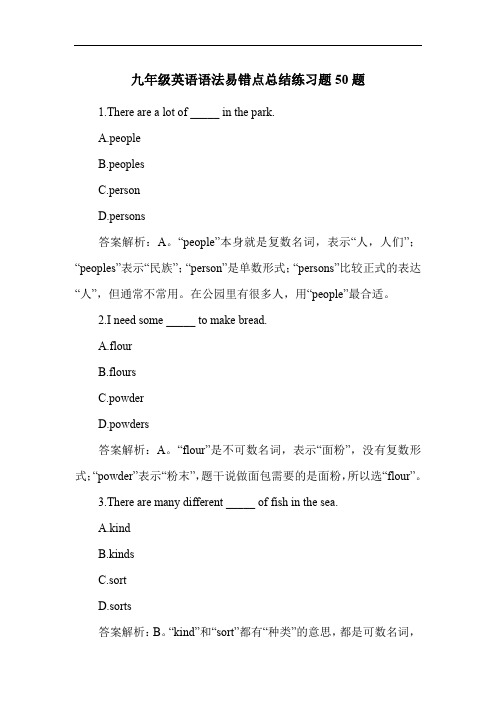
九年级英语语法易错点总结练习题50题1.There are a lot of _____ in the park.A.peopleB.peoplesC.personD.persons答案解析:A。
“people”本身就是复数名词,表示“人,人们”;“peoples”表示“民族”;“person”是单数形式;“persons”比较正式的表达“人”,但通常不常用。
在公园里有很多人,用“people”最合适。
2.I need some _____ to make bread.A.flourB.floursC.powderD.powders答案解析:A。
“flour”是不可数名词,表示“面粉”,没有复数形式;“powder”表示“粉末”,题干说做面包需要的是面粉,所以选“flour”。
3.There are many different _____ of fish in the sea.A.kindB.kindsC.sortD.sorts答案解析:B。
“kind”和“sort”都有“种类”的意思,都是可数名词,many 修饰可数名词复数,所以用“kinds”或“sorts”,“different kinds/sorts of”表示“不同种类的”。
4.My mother bought two _____ of apples.A.pieceB.piecesC.kiloD.kilos答案解析:D。
“piece”表示“片,块”;“kilo”表示“千克”,买苹果常用“kilos”,two kilos of apples 表示“两千克苹果”。
5.There is little _____ in the bottle.A.waterB.watersC.juiceD.juices答案解析:A。
“water”和“juice”都是不可数名词,没有复数形式,little 修饰不可数名词,瓶子里几乎没有水,所以选“water”。
九年级英语语法易错辨析练习题50题(带答案)

九年级英语语法易错辨析练习题50题(带答案)1. I don't know ______ he will come tomorrow.A. thatB. ifC. whatD. which答案:B解析:本题考查宾语从句的引导词。
A选项that引导宾语从句时无意义,在句中不充当任何成分,此处需要表示“是否”的引导词,所以A错误。
C选项what在宾语从句中要充当主语、宾语或表语等成分,这里从句不缺这些成分,C错误。
D选项which表示“哪一个”,不符合句子语境。
B选项if表示“是否”,符合题意。
2. The book ______ I bought yesterday is very interesting.A. whoB. whichC. whenD. where答案:B解析:这是一个定语从句。
先行词是book,是物。
A选项who用于先行词是人的情况,A错误。
C选项when在定语从句中作时间状语,这里先行词不是时间,C错误。
D选项where在定语从句中作地点状语,先行词不是地点,D错误。
B选项which用于先行词是物的定语从句中,正确。
3. She told me ______ she would go to the park.A. thatB. whereC. whetherD. which答案:A解析:本题考查宾语从句。
从句中不缺成分,表达一个陈述的事实,所以用that引导。
B选项where在从句中作地点状语,这里从句不需要表示地点,B错误。
C选项whether表示“是否”,从句不是表示疑问的语境,C错误。
D选项which在从句中要充当成分,这里不需要,D错误。
4. Do you know the man ______ is standing over there?A. whoB. whichC. whatD. when答案:A解析:这是一个定语从句,先行词是man,是人。
B选项which 用于先行词是物的情况,B错误。
九年级英语语法易错辨析练习题50题
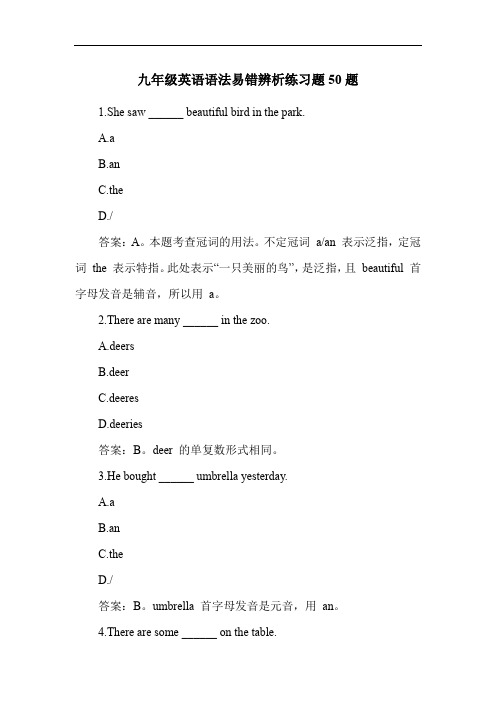
九年级英语语法易错辨析练习题50题1.She saw ______ beautiful bird in the park.A.aB.anC.theD./答案:A。
本题考查冠词的用法。
不定冠词a/an 表示泛指,定冠词the 表示特指。
此处表示“一只美丽的鸟”,是泛指,且beautiful 首字母发音是辅音,所以用a。
2.There are many ______ in the zoo.A.deersB.deerC.deeresD.deeries答案:B。
deer 的单复数形式相同。
3.He bought ______ umbrella yesterday.A.aB.anC.theD./答案:B。
umbrella 首字母发音是元音,用an。
4.There are some ______ on the table.A.knifesB.knivesC.kniveD.knivs答案:B。
knife 的复数形式是knives。
5.She has ______ interesting book.A.aB.anC.theD./答案:B。
interesting 首字母发音是元音,用an。
6.There are a lot of ______ in the library.A.booksB.bookesC.bookD.bookies答案:A。
book 的复数形式是books。
7.He has ______ new pen.A.aB.anC.theD./答案:A。
new 首字母发音是辅音,用a。
8.There are three ______ in the room.A.mansB.menC.manD.mens答案:B。
man 的复数形式是men。
9.She has ______ old bike.A.aB.anC.theD./答案:B。
old 首字母发音是元音,用an。
10.There are two ______ in the picture.A.womansB.womenC.womanD.womenes答案:B。
中考英语易错题专项练习精选(含答案)
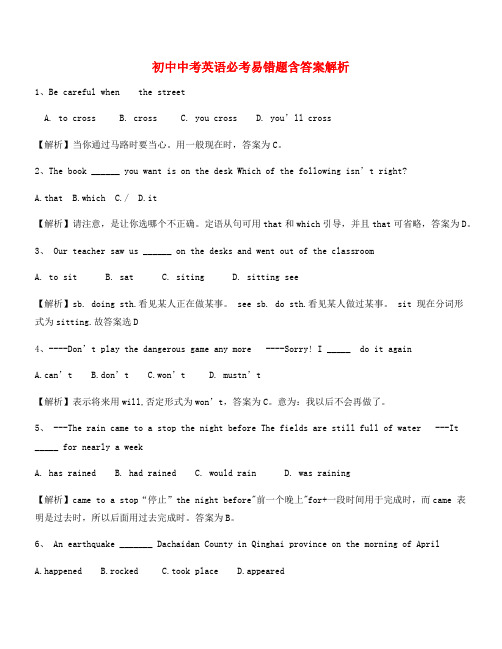
初中中考英语必考易错题含答案解析1、Be careful when the streetA. to crossB. crossC. you crossD. you’ll cross【解析】当你通过马路时要当心。
用一般现在时,答案为C。
2、The book ______ you want is on the desk Which of the following isn’t right?A.thatB.whichC./D.it【解析】请注意,是让你选哪个不正确。
定语从句可用that和which引导,并且that可省略,答案为D。
3、 Our teacher saw us ______ on the desks and went out of the classroomA. to sitB. satC. sitingD. sitting see【解析】sb. doing sth.看见某人正在做某事。
see sb. do sth.看见某人做过某事。
sit 现在分词形式为sitting.故答案选D4、----Don’t play the dangerous game any more ----Sorry! I _____ do it againA.can’tB.don’tC.won’tD. mustn’t【解析】表示将来用will,否定形式为won’t,答案为C。
意为:我以后不会再做了。
5、 ---The rain came to a stop the night before The fields are still full of water ---It_____ for nearly a weekA. has rainedB. had rainedC. would rainD. was raining【解析】came to a stop“停止”the night before"前一个晚上"for+一段时间用于完成时,而came 表明是过去时,所以后面用过去完成时。
- 1、下载文档前请自行甄别文档内容的完整性,平台不提供额外的编辑、内容补充、找答案等附加服务。
- 2、"仅部分预览"的文档,不可在线预览部分如存在完整性等问题,可反馈申请退款(可完整预览的文档不适用该条件!)。
- 3、如文档侵犯您的权益,请联系客服反馈,我们会尽快为您处理(人工客服工作时间:9:00-18:30)。
中学英语易错题训练选择题1. —Have you found the book? ——.A. No, not even onceB. Not yetC. No, alreadyD. Yes, I did2. I didn’t quite understand how they got the books back so .A. quickB. more quicklyC. quickerD. quickly3. I used on my own.A. to liveB. liveC. livingD. to living4. —you ever to Beijing ? —Yes, once.A. Have; goneB. Did; goC. Do; goD. Have; been5. Sorry, but your address again, please. I catch it.A. didn’tB. don’tC. won’tD. wouldn’t6. ——I saw Kate a green dress at the meeting.——I think she looks better red.A. dressed; inB. put on; wearC. wearing; inD. wear; put on7. What you angry with?A. haveB. willC. areD. do8. The dirty river .A. is smelt badB. smells badlyC. is smelt badlyD. smells bad9. The radio is too noisy. Will you please ?A. turn off itB. turn it onC. turn it upD. turn it down10. There’s going to a film show modern art in the library.A. be; atB. have; ofC. have; onD. be; about11. Would you please your shoes on the floor?A. not to dropB. not dropC. don’t dropD. not dropping12. Where does your sister her meals?A. hasB. haveC. havingD. had13. Mike and his sister here a moment ago.A. isB. areC. wereD. be14. It was New Year’s Eve. Xiao Ming was busy some new pictures on the wall.A. put upB. puts upC. putting upD. putting on15. I often porridge for breakfast those days.A. havingB. haveC. hasD. had16. Tea is in the south of China.A. growB. growsC. growingD. grown17. How about out for a walk?A. goB. to goC. goingD. goes18. I heard her that she was too fat.A. saysB. to sayC. saidD. say19. Shall we at the school gate?A. meetB. to meetC. metD. meeting20. It’s much better than TV at home.A. watchB. watchesC. watchingD. watched21. Look! Li Lei and Lin Feng kite over there.A. is flyingB. are flyingC. fliesD. flew22. You the house at once or I the police.A. leave; callB. leave; will callC. will leave; callD. will leave; will23. The train for ten minutes when we reached the station.A. had goneB. had leftC. went awayD. had been away24. The Kings TV when I to see them.A. were watching; wentB. was watching; wentC. are watching; are goingD. watched; was going25. My uncle for Hong Kong next week.A. is goingB. is leavingC. will goD. left26. How many machines in the last few weeks?A. did they makeB. will they makeC. have they madeD. are they making27. What he do as soon as he free tomorrow?A. does; isB. will; will beC. will; isD. does; will be28. I thought he us something interesting about France because he there.A. would tell; had beenB. had told; would goC. will tell; wentD. would tell; had gone29. We will have a sports meeting if it rain tomorrow.A. won’tB. isn’tC. doesn’tD. has30. —Where were you in July last year?—This time last year my family and I grandparents in New York.A. was visitingB. visitedC. had visitedD. were visiting31. Could you tell me if she a talk tomorrow?A. would giveB. has givenC. will giveD. gives32. He hardly hurt himself in the accident, he?A. doesn’tB. didn’tC. didD. does33. How long the TV play ?A. has; beganB. did; openC. did; lastD. has; watched34. Mr Smith with his parents China since two years ago.A. have been inB. have gone toC. has been toD. has been in35. of the two girls is from Beijing.A. AllB. BothC. NoneD. Neither36. We went to travel with some friends of .A. us B ours C. our D. ourselves37. Why not look up the new word in a dictionary you don’t know it?A. ifB. thatC. thoughD. whether38. all the passengers are here, why don’t we start at once?A. As soon asB. AfterC. Now thatD. When39. —I’m going to Hangzhou for a holiday this weekend.—you are there, can you buy me some green tea?A. BecauseB. WhileC. IfD. Though40. I can’t understand this passage there are no new words in it.A. ifB. becauseC. thoughD. and41. the night before Christmas Day, parents fill their children’s stocking with smallpresents.A. InB. AtC. ToD. On42. The book was written English.A. inB. withC. fromD. by43. —Sorry, Miss Zhang. I’m late again. —Oh no, Meimei. You’re just in time class.A. forB. atC. ofD. on44. You don’t need to look every new word in your dictionary while reading.A. forB. atC. afterD. up45. The coat bought last week is too big for me. I’d like to change it for a one.A. smallB. largeC. nicerD. smaller46. Of all these subjects, I like Chinese .A. moreB. betterC. wellD. best47. Things are on the moon on the earth.A. much lighter; thanB. much heavier; thanC. as heavy; asD. not so light; as48. —I’ve had enough bread. Would you like ? —No, thanks.A. a few moreB. one moreC. another moreD. some more49. The ice in the lake is about one meter . It’s strong enough to skate on.A. longB. highC. thickD. wide50. —will Mr Green go back to London? —In two weeks.A. How often B How long C. How soon D. How far51. —We are going to see a film this evening. Why not go with us?—I have to do many things this evening. I’m , you see.A. freeB. gladC. sorryD. busy52. Look! beautiful that lake is!A. WhatB. HowC. How aD. What a53. I’m still hungry. Could I have two pieces of bread, please?A. muchB. manyC. moreD. most54. —Who did it better, Bill or Henry? —I think Bill did just Henry.A. as well asB. as good asC. as better asD. more badly than55. Mr Smith’s plane . Let’s wait for him here.A. hasn’t arrivedB. didn’t arriveC. doesn’t arriveD. couldn’t arrive56. Almost all the water gone. Please save water!A. areB. isC. haveD. were57. Mr Li is out. But he here ten minutes ago.A. wasB. isC. will beD. would be58. —Look! The bus is coming. —But it’s full of people. We can’t it.A. get offB. get downC. get on withD. get on59. Jane a new dress every month when she was in Shanghai.A. buysB. is buyingC. boughtD. will buy60. A. talk on Chinese history in the school hall next week.A. is givenB. has been givenC. will be givenD. will give61. I will tell you how to get to the place, you’d better it .A. try; onB. get; offC. take; downD. pick; up62. Germany and Great Britain are countries, but China and India are ones.A. developing; developedB. developed; to developC. developed; developingD. to develop; developing63. —Must I finish my homework now? —No, you . You do it this evening.A. mustn’t; canB. needn’t ; mayC. can’t; mustD. needn’t; must64. The VIPS (Very Important Persons) from 21 countries will the APEC in Shanghaithis autumn.A. holdB. take part inC. joinD. attend65. The government will some new colleges for more student’s to receive highereducation.A. set upB. set outC. put downD. put on66. —Excuse me. Will you please tell me the way to the railway station?—Oh, sorry, but I don’t know. You go and ask that policeman.A. mayB. mustC. wouldD. should67. —It’s a lovely day, it? —Yes. Let’s go out for a walk.A. doesn’tB. haven’tC. aren’tD. isn’t68. —We can use MSN to with each other on the net.—Really? Will you show me how to use it?A. speakB. talkC. sayD. tell69. —What does the sentence “Don’t trouble till trouble you” mean?—Sorry, I have no idea.A. troubleB. troublesC. troubledD. will trouble70. —Did you work out the problem, Tom?—Yes, of course. I to the teacher’s.A. have just beenB. have just gotC. have just comeD. have just gone71. —do you about spring? —The flowers and the green trees.A. How; likeB. How; thinkC. What; thinkD. What; like72. —Mike wants to know if a picnic tomorrow.—Yes. But if it , we’ll visit the museum instead.A. you have; will rainB. you will have; will rainC. you will have; rainsD. will you have; rains73. We usually have six lessons a day, and each of them 45 minutes.A. lastB. lastsC. haveD. need74. It ten years since they to France.A. was; movedB. was; have movedC. is; have movedD. is; moved75. Today, the forests have almost gone. People must down too many trees.A. stop to cutB. stop from cuttingC. be stopped to cutD. be stopped from cutting76. The doctor did what he could that child.A. saveB. to saveC. savedD. saving77. Mother said that cooking much time every day.A. paidB. spentC. madeD. took78. I can’t understand the boy alone.A. why she leftB. why did she leaveC. why had she leftD. why did she leave79. You’d better your shoes on the floor?A. not to dropB. not dropC. don’t dropD. not dropping80. —Your coat looks nice. Is it cotton? —Yes. It’s Shanghai.A. made of; made byB. made of; made inC. made for; made byD. made from; made in81. —So you went to see the film with Tom. —Yes. Bob with me.A. won’t goB. isn’t goingC. doesn’t goD. wouldn’t go82. —Excuse me. Where is the Science Museum?—Take No. 3 bus and at the fourth stop.A. get onB. get offC. get upD. get to83. —Your name again? I quite catch it. —Federico MacAdam.A. didn’tB. don’tC. wouldn’tD. won’t84. This is an old photo of mine when I .A. have short hairsB. had short hairsC. have short hairD. had short hair85. —Can I this book? —Yes, but you mustn’t it to others.A. lend; borrowB. borrow; keepC. borrow; lendD. lend; keep86. —Which of Shanghai do you come from?—Let me show you on the map.A. cityB. villageC. countryD. part87. Can you tell us ?A. where have you goneB. where you have goneC. where have you beenD. where you have been88. There are few people on the playground, ?A. are thereB. are theyC. aren’t thereD. aren’t they89. —They haven’t paid for their tickets, have they?—. They didn’t pay any money.A. Yes, they haveB. No, they haven’tC. Yes, they didD. No, they didn’t90. —I haven’t seen you for a long time. How is everything, Kate?— .A Not too bad B. Very well C. Not at all D. I’m all right91. —I hope you don’t mind my pointing out your mistakes.—.A. Not at allB. You’re welcomeC. Of courseD. It’s a pleasure92. —Do you mind if I open the door?—.A. No, of course notB. Yes, pleaseC. Yes, you canD. No, you can’t open it93. —Mike, I’ll go for the football match.—I hope you win the game.A. Very well.B. See you.C. Good luck!D. congratulations!94. —I lost my new bike yesterday.—.A.Don’t worry. You can buy another one.B.I’m sorry to hear that.C.Never mind.D.Who did it?95. “Let’s go for a long walk into the country this morning.”“, but I think I’m catching a cold.”A. I certainly could use the exerciseB. Yes, let’s goC. Sure. I’d like to go for a long walkD. No, I won’t96. , but I can’t tell you about that.A. Excuse meB. I’m sorryC. All rightD. By the way97. —?—It’s eight.A. What day is itB. What’s five and threeC. How old are youD. What’s your telephone number98. —What a nice meal! Thank you for having us.—.A. It doesn’t matterB. It was a pleasureC. Not nice enoughD. With pleasure99. —.—Yes, please. I’d like half a kilo of meat.A. Would you like some meat or fishB. What about something to eatC. How do you like thisD. Can I help you100. How long has he ?A. diedB. been deathC. been deadD. dead参考答案:1-5 BDADA 6-10 CCDDD 11-15 BBCCD 16-20 DCDAC 21-25 BBDAB 26-30 CCACD 31-35 CCCDD 36-40 BACBC 41-45 DAADD 46-50 DADCC 51-55 DBCAA 56-60 BADCC 61-65 CCBDA 66-70 ADBBA 71-75 DCBDD 76-80 BDABB 81-85 DBADC 86-90 DDABB 91-95 AACBA 96-100 ABBDC。
